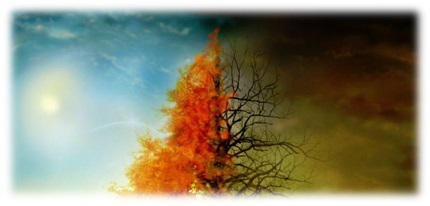A Coaching Power Tool Created by Alejandro Fernandez
(Leadership Coach, COSTA RICA)
The Minotaur, the beast that lives at the heart of the labyrinth and feeds of Young men and women, was named Asterion. Star. The luminosity to be found in a dark night is not the sun, not ordinary light, but a special radiance that doesn’t undo the night. Thomas Moore in Dark Nights of the Soul
The Dark Night of the Soul is this state of consciousness where we feel trapped by circumstances and emotions that unsettle our happiness and stability. Little can we do to change those circumstances that placed us into the night, and that feeling of powerlessness sink us down in deep sorrow.
Some examples of dark nights can be: Losing your job and not being able to find another, a beloved one passes away unexpectedly, you find that you spouse cheated on you, a terminal disease is diagnosed, you experience a deep spiritual and existential crisis. Those are just examples, what really describes a dark night is not the outer experience or the conditions that triggered it, but the inner feeling of your whole world falling apart.
The dark passages are those moments in life filled with tribulation in which beliefs that we once considered essential are collapsed. As a consequence of that, we feel trapped into a plethora of profound dilemmas full of paradoxes and contradictions. The ultimate thesis of this Power Tool is that in the midst of this torment, the bigger paradox of all is that those same contradictions that provoke our sorrow, really constitute the only way to save ourselves from the false logic in which we live.
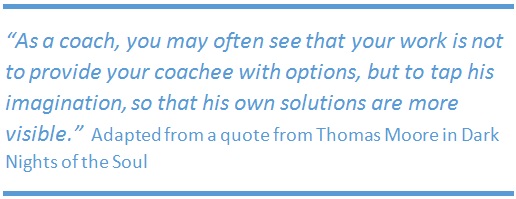 What is the role of a coach when working with a client that is going through a dark night? We already now that we must renounce to the idea that we as coaches are the ones helping our customers, what we really do is to simply facilitate a space of awareness where the client himself finds a solution to his own challenges. The same applies for the dark night. To understand its anatomy and its role in the human’s cosmic vision easies down the terrible temptation that we as coaches face to attract the customer to an allegedly more illuminated and healthy path.
What is the role of a coach when working with a client that is going through a dark night? We already now that we must renounce to the idea that we as coaches are the ones helping our customers, what we really do is to simply facilitate a space of awareness where the client himself finds a solution to his own challenges. The same applies for the dark night. To understand its anatomy and its role in the human’s cosmic vision easies down the terrible temptation that we as coaches face to attract the customer to an allegedly more illuminated and healthy path.
Even our own ego as personal development professionals can cheat on us and make us believe that we are some sort of lighthouse in the hazy swamp being walked down by the customer. But this is not the case, we are not even candle bearers to light on their path. We simply whisper insightful questions to their ears, questions that will help the coachee discover that he doesn’t need light from anybody, that he doesn’t need to chase any lighthouse. He just have to look inwardly and find his own light. This task will be easier thanks to the profound contrast brought by the dark night of the soul.
In summary, this immersion activated by the dark night is commonly seen as something not healthy. However, a deeper look to the night’s vicissitudes could give birth to an outstanding truth: Yes, dark nights could be out of the ordinary experiences, but they don’t belong to the realm of sickness.
That said, the role of the coach is not to get the client “out of the dark night” His role is to facilitate the uncovering of questions that this dark night makes to the client. Using active communication, and listening, fostering the design of alternate perspectives and throwing powerful questions to the coaching space, the client can discover that the dark night is not a sickness that needs to be avoided, nor an experience that goes against nature but in favor of it.
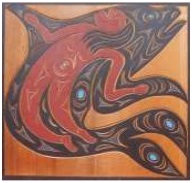 We can use the biblical myth of Jonah, -this character that lived in the stomach of a big fish for 3 days- as a metaphor to the dark night. According to Thomas Moore, the fish’s belly is some sort of womb that gives birth to a different person. A person more capable to irradiate his own inner light, but not a simple light, not a completely pure light, but a “lunar light”, a luminosity -as the author calls it- that is not complete darkness but neither complete daylight.
We can use the biblical myth of Jonah, -this character that lived in the stomach of a big fish for 3 days- as a metaphor to the dark night. According to Thomas Moore, the fish’s belly is some sort of womb that gives birth to a different person. A person more capable to irradiate his own inner light, but not a simple light, not a completely pure light, but a “lunar light”, a luminosity -as the author calls it- that is not complete darkness but neither complete daylight.
This whale that swallowed you into this dark night is taking you some place, but where?
The coachee doesn’t know yet, but the dark night is a container that is heading to a mysterious place. Eventually it will harbor somewhere and that destiny is to be discovered by him, not by the coach.
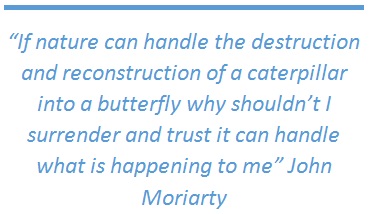 To identify the dark night as a “womb with purpose” and not as a calamity that needs to be expelled, allows the coach to contemplate himself and his coachee with compassion. It concedes to look at the process with some distance from the moral judgments that naturally arise when looking at the causes of the dark night. The sadness and loneliness that we feel in the midst of the dark night prevents us from realizing that this process is part of the beginning of a gestation: A necessary incubation to transform our identity.
To identify the dark night as a “womb with purpose” and not as a calamity that needs to be expelled, allows the coach to contemplate himself and his coachee with compassion. It concedes to look at the process with some distance from the moral judgments that naturally arise when looking at the causes of the dark night. The sadness and loneliness that we feel in the midst of the dark night prevents us from realizing that this process is part of the beginning of a gestation: A necessary incubation to transform our identity.
We live in a society that aims to “enlightment” as the ideal destiny of our spiritual and personal development. I suggest to look for a more comprehensive path that integrates both darkness and light into a more luminous and human radiance. We want to quickly put an end to sickness and its symptoms instead of listening to what the sickness has to say about our body and our life. We want to eradicate ego and its darkest aspects in order to finish suffering, but we overlook the fact that ego is a path that we need to go through, not repress. We look for coaches, therapists, doctors with the goal to heal, but sometimes our definition of healing does not understand that there needs to be a wound in order for the infection to go out, and that its scars represent a sacred reminder of the better person we have embodied. We are an allopathic society concentrated in eradicating symptoms of our darkness, but what if we shift our perspective? What if homeopathic doses of darkness are needed to handle our hard times in a way that is more consonant with the universe?
One of the goals of a coaching process dealing with the dark night is to blossom the idea that there is nothing wrong with us because we are living a dark night. To fall in its pawns is not something that we should avoid at all cost, neither something to be pursued proactively. It will simply come to our lives in the taste, tone and time just necessary to elicit the sort of ordeal needed to initiate the incubation of our next self.
Consider the following questions to tap your imagination and shift perspective in regards to how to handle the Dark Night:
- What if your life’s ordeals are paths to purification rather than mere punishments for our unconscious actions?
- What if we regard the dark times of our life as rite passages to rip off obsolete parts of our identity?
- Are our tribulations real callings to acquire consciousness of our dark side and stop being at its mercy?
- What would happen if our intention to end the dark night is replaced with the intention to contemplate it from a place of wisdom and awareness?
- What would happen if rather than pretend to expel your demons by repressing them –and therefore making them stronger- you sit down and have a cup of tea with them?
- Have you considered that darkness is darkness just because you turn your back at it, rather than lighten it with the eyes of your consciousness?
- What would happen if you regard your dark night as a rebellion from your consciousness rather than a place of depression and trauma?
- Have you considered that the dark night could be a solution to your complex dilemmas that have tormented you for decades?
- What if your dark knight constitutes a way to drain old beliefs that accumulated pain for years? A way to remove the blockage built by your ego to perpetuate an unsustainable identity?
- If you could change the depressive idea of the dark night, what would happen if you look with deep irony and humor this obscure passage?
- How would you feel if you look at your negative emotions not as signs that there is something wrong, but as trials to shape a new person?
- If your dark night could speak to you and tell you that it has come to teach you something, what would it say?
 We run away from the dark. In this age we privilege instruments of personal growth created to take us out of the imbalance caused by our ordeals. But what if the exit is not going outside but going through? What if we shift our idea that the dark nights are horrifying experiences that we need to escape from, but purification processes needed to arise from ashes?
We run away from the dark. In this age we privilege instruments of personal growth created to take us out of the imbalance caused by our ordeals. But what if the exit is not going outside but going through? What if we shift our idea that the dark nights are horrifying experiences that we need to escape from, but purification processes needed to arise from ashes?
In the traditional paradigm, the coachee can hire a coach to get support in his plan to escape from his dark night and become healed. But this power tool emphasizes the necessity to bring consciousness to the real sense and purpose of the dark night. Shift our attention to the effect that resistance has in our suffering, explore and immerse in its darkness instead of running away from it and accept its teachings as a bridge to a life of higher possibilities.
Self-Application
It is highly probable that in our adult life most of us have gone through at least one or two dark nights. Your emotional and spiritual scars are the evidence.
When was the last time you went through a dark night of the soul? How did you welcome it in your life? Did it leave a permanent mark that made your identity lighter? Is it still a psychological burden that hinders your happiness?
Think about your dark passages. Did they made you a more wise and integral human being? Did those contribute to treat your allergy to darkness? How did you handle anxiety and sorrow during that difficult time? When did you come to understand the true meaning of that dark night in your life? How that experience made you a better coach?
The same way a caterpillar doesn’t resist to its imminent transformation into a butterfly, nor anxiously plans what color its wings will be; you sit down and reflect on how the fixation on your past or the conditioning to a pre-existing idea of the future have made your dark passages longer or more difficult to deal with.
Tools to carry on your backpack through the dark night
Dark night represents a collapse of your most essential beliefs about our identity. This collapse sinks us in an existential crisis that desperately wants an answer on why we are given this burden. Find below a list of tools that can make your transit through the dark night a wise master instead of an inexplicable punishment:
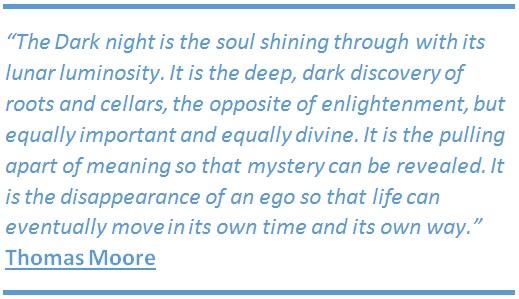 Re-Engineer your perspectives: Clinging to the beliefs that want to be destroyed by the dark night will only increase the risk of depression. The journey through this emotional swamp is a calling to question our most cherished views. Using powerful questions such as those given by this power tool, the coachee can discover new ways to appreciate his passage through the dark night.
Re-Engineer your perspectives: Clinging to the beliefs that want to be destroyed by the dark night will only increase the risk of depression. The journey through this emotional swamp is a calling to question our most cherished views. Using powerful questions such as those given by this power tool, the coachee can discover new ways to appreciate his passage through the dark night.- Humor and irony: The dark passage represents an enormous paradox full or irony. This paradox serves as fertile soil to awaken some sort of black humor that can ease down and relax our resistance to tribulation.Re-Engineer your perspectives: Clinging to the beliefs that want to be destroyed by the dark night will only increase the risk of depression. The journey through this emotional swamp is a calling to question our most cherished views. Using powerful questions such as those given by this power tool, the coachee can discover new ways to appreciate his passage through the dark night.
 Art: Artistic expression can symbolically represent the contradictions and paradoxes of our existence. Poetry, acting, drawing or any creative activity can be useful. The magic of these techniques is to use symbolic and metaphorical language to access facets about the dark night that wouldn’t be coherent at all by our rational conscience.
Art: Artistic expression can symbolically represent the contradictions and paradoxes of our existence. Poetry, acting, drawing or any creative activity can be useful. The magic of these techniques is to use symbolic and metaphorical language to access facets about the dark night that wouldn’t be coherent at all by our rational conscience.
- Reflection Questions Psychomagic and Psychodrama: Known exercises like hitting a pillow with all your anger, or Alejandro Jodorowsky’s psychomagic which intends to free our un-conscious energy using symbolic rituals, can be powerful allies in the journey through the dark night. In Psychodrama, a trained facilitator recreates scenes from our sub-conscious in real time, and walks the protagonist through a coherent interpretation that brings catharsis.
- Don’t do anything: Modern culture makes us think that the dark night is an indicator of regression and sickness. Under this paradigm, we need to keep moving and take action to overcome it. But what it all we have to do at first is sit and listen? What if trying to provoke the birth before time will only worsen the situation? Don’t do anything else but turning on your awareness and get rid of your aversion to darkness.
Reflection Questions
References
Moore Thomas. 2005. “Dark Nights of the Soul”. New York, Gotham Books, Penguin Group Inc.
Foster, Jeff. Posted by Jeff Foster on July 25, 2013 in Blog “The Deepest Acceptance”, The Medicine is Now. (online) Available at:
Foster, Jeff. Posted by Jeff Foster on April 16, 2014 “The Deepest Acceptance”, Roots. (online) Available at:
Jodorowsky, Alejandro. 2010. “Psychomagic: The Transformative Power of Shamanic Psychotherapy” Inner Traditions. Tra Edition.
